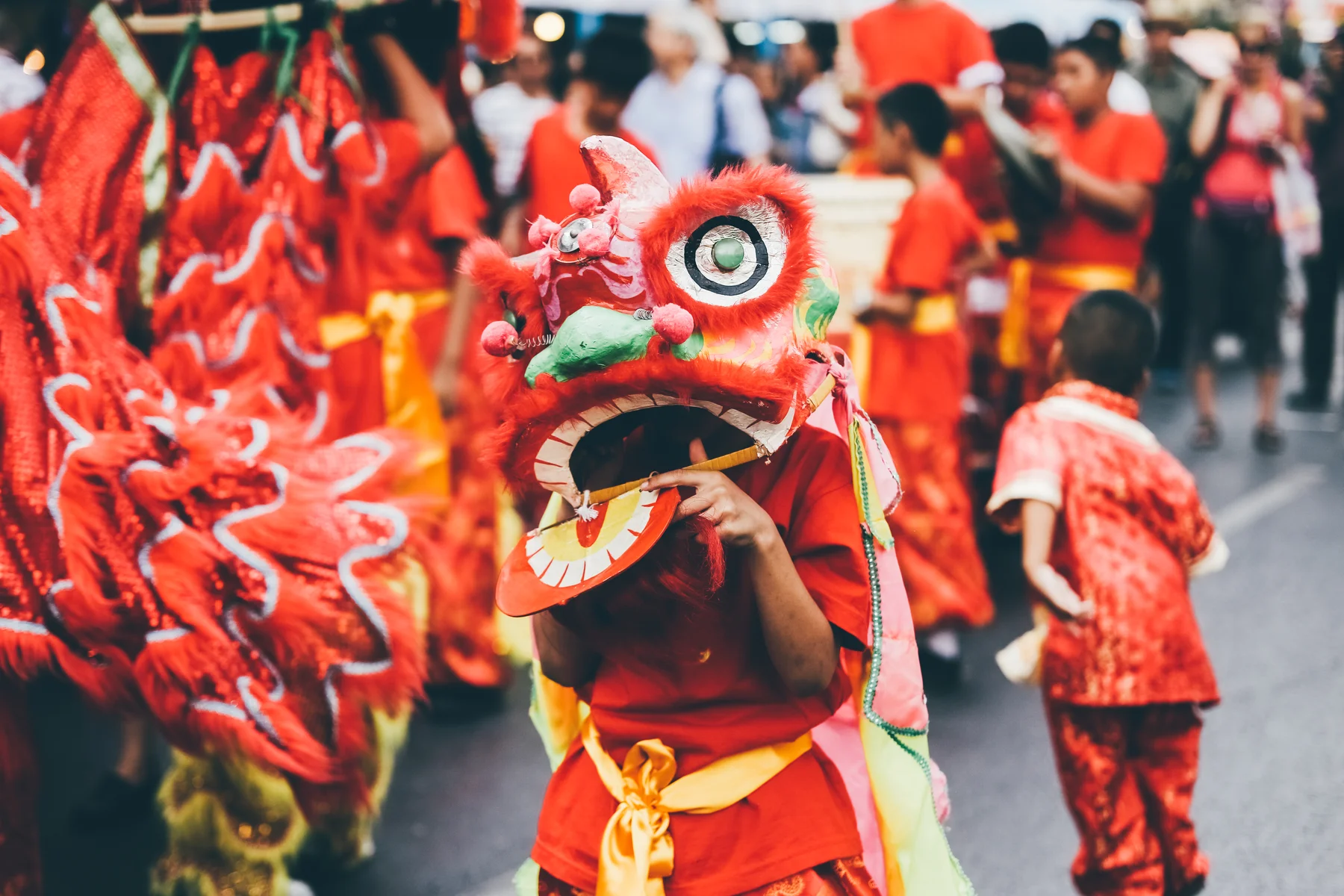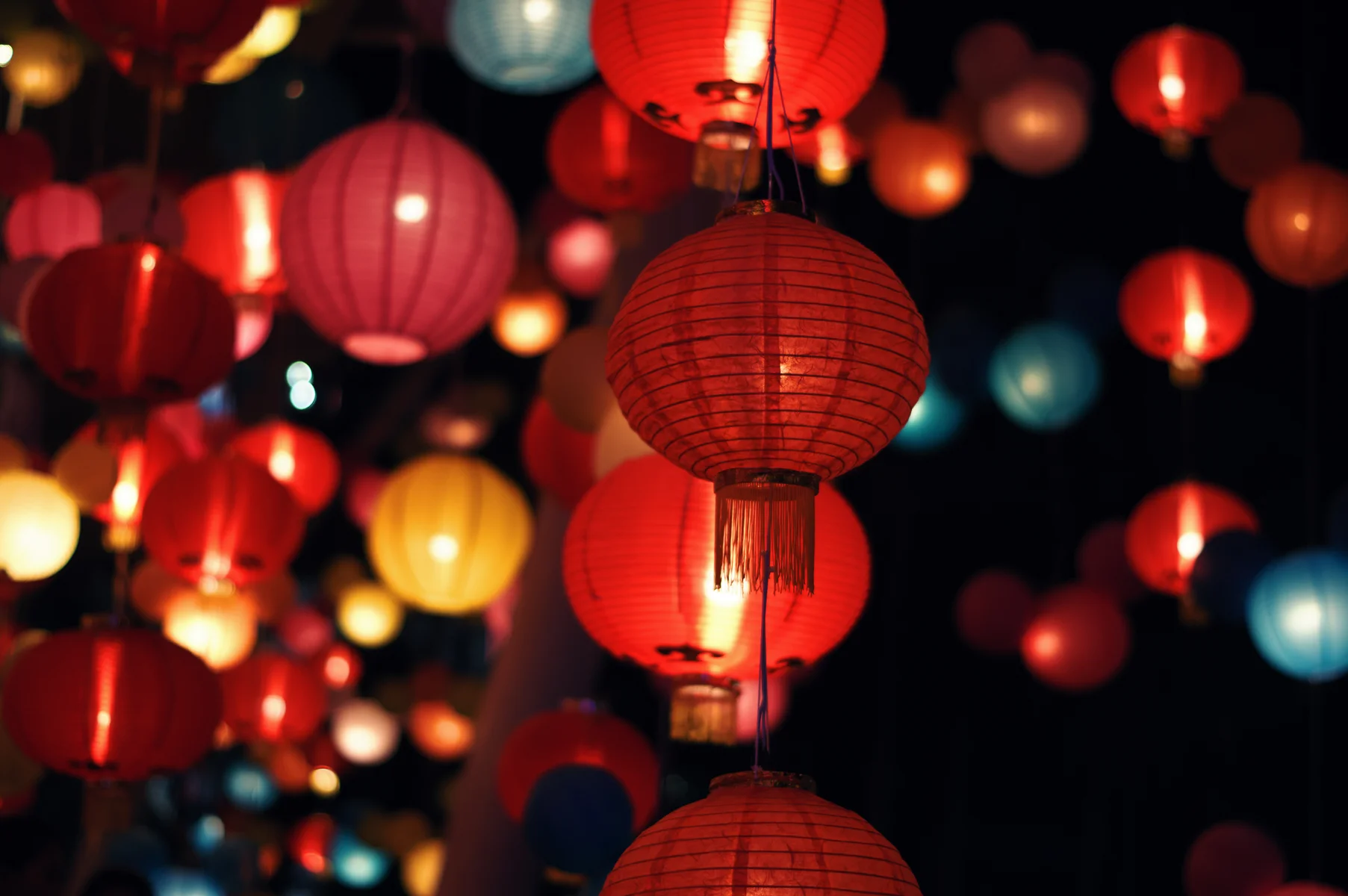
New Year in China: history, traditions, and gifts
Want to keep celebrating the New Year? Then it’s worth adding the Chinese New Year to your schedule, following the example of 20% of the world’s population. More details about the Chinese New Year and its traditions below.
The Chinese New Year, or Lunar New Year, will be celebrated in 2026 with new energy. The symbol of the coming year will be the Red Fire Horse, a bright and active animal that brings an impulse for change and new beginnings. In 2026, the Chinese will start celebrating on February 17, and the festivities will last until March 3. We have gathered all the important information about this holiday: from traditions and attributes to dishes and gifts.
Chinese New Year: Brief History
2026 will be the 4723rd year in China according to their current calendar. The count begins from the moment the legendary ruler Huangdi (Yellow Emperor) came to power. Back then it was an occasion to celebrate the harvest and pay homage to the gods. Today it is primarily a family holiday, when everyone goes to their relatives and welcomes the new year together.
It is worth noting that the Chinese also celebrate the Gregorian New Year we are used to, but modestly. However, the main holiday for the Chinese people is precisely the Lunar New Year, or Spring Festival (Chūnjié); in Chinese it is written as 春节. By the way, the name fully corresponds to reality: it is at the end of January–February that the first spring warmth arrives in China.
A local legend says that on the day the new year begins according to the lunar calendar, the monster Nian emerges from the sea onto land — a huge beast with a long horned head that devours all people’s supplies. It is believed that in the past, during its arrival, the Chinese from coastal villages fled their homes in fear and hid in caves.
This continued until one old man came up with various charms against the monster: he began sticking red paper on all doors, burning bamboo, and wearing red clothes himself. Nian was frightened by these attributes and never came again. Therefore, the Chinese still observe these traditions to this day.
When Does the Chinese New Year Begin in 2026
The date of the Chinese New Year is determined by the lunar calendar and changes every year. The first day of the new year falls on the second new moon after the winter solstice (December 21).
In 2026, the Chinese New Year will begin on February 17, and official public holidays in China will last from February 16 to February 22. The festive celebrations will conclude with the Lantern Festival on March 3, 2026, making a total of about 15 days of festive atmosphere. This is the longest holiday in East Asian countries.
Each day has its own meaning and tasks:
- February 16 (eve) — family reunion dinner with symbolic dishes.
- February 17 (first day) — new red clothes, visiting relatives, New Year greetings.
- February 17–21 — folk festivities, fireworks, temple fairs.
- March 3 — final Lantern Festival.
Chinese New Year 2026: Symbol — Red Fire Horse
Each new year according to the Chinese calendar is associated with a specific animal sign. The Chinese zodiac calendar (Eastern horoscope) includes 12 animals:
Rat, Ox, Tiger, Rabbit, Dragon, Snake, Horse, Goat, Monkey, Rooster, Dog, Pig.
Since this cycle repeats every 12 years, it is easy to determine if it is your year — simply check if your age is divisible by 12.
Horse years: 1930, 1942, 1954, 1966, 1978, 1990, 2002, 2014, 2026.
Colors and elements also change: yellow, white, green, red; earth, metal, water, wood, fire. Each combination of sign, element, and color in the Eastern horoscope repeats once every 60 years.
Red Fire Horse 2026
The symbol of 2026 will be the Red Fire Horse — the brightest version of this sign. It combines charisma, ambition, and explosive potential for change. The Fire element enhances the Horse’s activity, attracts attention, inspires, and charges with decisive steps.
In Chinese culture, the Horse is a symbol of independence, movement, and freedom. According to forecasts, 2026 should be a year of bold decisions, active actions, and reboot. The universe invites everyone to show what they are capable of.
What Are the Character Traits of People Born in the Year of the Horse
The Horse occupies the seventh position in the Chinese zodiac cycle and symbolizes independence, movement, and vitality. Representatives of this sign are cheerful, lively, and quick-witted people.
Strengths of the Horse
People born in the year of the Horse possess the following qualities:
- Purposefulness and hard work. Horses are always in search of feats and new discoveries. They know how to earn money and value it.
- Independence and freedom. These are people who prefer to work alone rather than in a group. They are more comfortable making their own decisions.
- Charisma and sociability. Horses are natural leaders who know how to attract attention and be remembered. They are eloquent and can become good speakers. They are often the center of attention and love being around people.
- Honesty and insight. People of this sign are known for their honesty, endurance, and determination. They are perceptive and talented, easily understand people.
- Love of adventure. Horses are prone to risk and seeking new experiences. They crave thrills and are always ready to try something new.
Weaknesses of the Horse
The disadvantages of people born in this year include:
- Hot temper and stubbornness. Horses can be impulsive and do not like advice, perceiving help as interference.
- Instability in relationships. Due to constant mood swings, relationships with others can deteriorate. Horses need a high degree of freedom.
- Inability to save money. People of this sign often consume more than necessary.
Characteristics of Male and Female Horses
Male Horse — a bright personality who is always in the center of attention. Excellent sense of style in clothing, good appearance, ease in communication help him maintain a worthy position in society. He is distinguished by self-confidence and enterprise, easily takes initiative into his own hands.
Female Horse — the most rebellious of all Chinese zodiac signs. She is self-confident, independent of others’ opinions, and unable to tolerate restrictions. She is an independent, self-reliant person quite capable of living without a reliable shoulder nearby.

Lucky Symbols and Omens for the Fire Horse
In Chinese astrology, there is a whole set of favorable and unfavorable elements for people born in the year of the Horse, especially the Fire Horse.
Lucky Numbers and Colors
Lucky numbers for the Horse are 2, 3, and 7.
Main lucky colors:
- Red — the color of Fire, the main element of 2026. Attracts money, attention, protects from evil spirits and misfortunes.
- Orange and scarlet — derivatives of the fiery palette, carry the energy of activity in a softer key.
- Gold — symbolizes wealth and prosperity.
Auxiliary colors:
- Green, jade, olive — colors of Wood that feed Fire. Symbolize growth and vitality.
- Earth tones — terracotta, brown, beige, sandy. Symbolize stability and reliability.
Unlucky colors: avoid white, black, and gray, which overshadow fiery energy.
Favorable directions: west and south.
Compatibility in Relationships
In love relationships, people born in the year of the Horse show themselves as passionate and subtle natures. Despite their love of freedom, they can become loyal partners. However, they require the same devotion and can be suspicious.
The most harmonious unions the Horse traditionally forms with Tiger, Goat, and Dog. With these signs, they create partnerships based on mutual respect and freedom.
Features of the Year for Horses Themselves
For people born in the year of the Horse, 2026 is their finest hour. The energy of the Fire Horse enhances all their qualities: charisma, determination, desire to act. The world seems to open its gates before them, and everything that previously seemed impossible suddenly becomes achievable.
In career, acceleration is expected: major projects, new offers, recognition, and leadership are possible. Those who have worked long without visible results will finally receive a return. Single Horses will be able to meet happiness, and existing couples should devote more time to each other.
Important warning: do not overestimate your strength and chase everything at once. A horse tired at a gallop quickly loses balance. Move forward confidently, but without haste.
How the Chinese New Year Is Celebrated
The Chinese New Year is associated with many traditions and customs. Here are the most important ones:
- Mass fireworks launches. The holiday begins with fireworks and lighting incense. The louder — the better, as loud sounds scare away the monster Nian.
- Prayers in temples. On the eve of the New Year, many people gather in famous temples to pray for happiness and luck. This tradition preserves the spiritual meaning of the holiday.
- Placing treats. To avoid meeting the monster Nian, you need to put something tasty on the doorstep to distract its attention.
- Red color everywhere. Nian is afraid of the color red, so red is used everywhere. Red paper lanterns, decorations, and outfits are especially popular.
- Family reunion dinner. An indispensable attribute is Nianye fan (tuanyuanfan) — dinner in the family circle on the eve of the New Year. This is the most touching moment of the holiday when all family members gather together.
- Folk festivities. Streets feature dancing lion and dragon figures — symbols of triumph and good fortune. In 2026, bright installations, light shows, and performances emphasizing the energy of the Fire Horse are expected.
- Temple fairs (miaohui). These began in ancient times. Today they are mostly secular events with theatrical performances, concerts, and delicacies tasting.
- New clothes. The Chinese New Year must be met in new clothes, and underwear must be red.
- General cleaning. Before the New Year, the house must be thoroughly cleaned — this way you get rid of unnecessary things and negative energy.
- Flowering plants in the house. It is advisable to decorate the home with blooming flowers — they symbolize rebirth, abundance, and professional growth.
- Money tree. Instead of a Christmas tree, in China they make a money tree. This is done as follows: a deep pot is filled with rice, cut branches are placed in it, and many ancient copper coins (mon) and red ribbons are tied to them.
- New Year Gala Concert. On the eve of the Spring Festival in China, it is customary to watch the New Year Gala Concert on CCTV. The show starts at 20:00 and continues until early morning. In recent years, live streams have become available on YouTube.
- “Shou Sui” (Guarding the Year). After dinner, people usually do not go to bed to not miss future happiness. In the country, this tradition is called: “Guarding the Year”.

Taboos During the Chinese New Year
And here is what you should not do:
- Do not wash or cut hair. On New Year’s Eve you cannot wash — you may wash away all your luck. For the same reason, do not cut hair — you cut off part of your well-being.
- Avoid negative words. Do not pronounce negative words and do not call misfortune upon yourself and your loved ones.
- Do not break dishes. Breaking things reduces your chances of prosperity and luck. This especially applies to glassware, which symbolizes fragility.
- Do not clean. This refers specifically to the celebration itself. Cleaning or throwing out trash can take luck out of the house.
- Do not use sharp objects. Scissors and sharp objects obstruct the flow of wealth and success. In the year of the Fire Horse, this is especially dangerous as it can intensify conflicts.
- Do not take loans or get into debt. Financial obligations at this time promise difficulties for the whole year.
- Avoid medicine. Avoid taking medications and visiting doctors so as not to get sick all year. Of course, chronic and serious illnesses are exceptions.
- Do not quarrel or cry. All issues should be resolved peacefully — then the new year will pass in the same spirit.
- Avoid white and black. These colors are associated with mourning and emptiness in Asian culture, especially for the energetic Fire Horse.
- Especially avoid amounts with the number 4, as it sounds like the word “death” in Chinese.
How Streets and Homes Are Decorated in China for the New Year
The main color of this holiday remains rich red, symbolizing happiness, luck, and protection from evil spirits. In 2026, orange, gold, and green tones will be added to red.
Traditional Decorations
Paper cutouts “chuang hua”. Central elements of festive decoration are these elegant ornaments made with special care. Craftsmen glue them to windows using sticky rice glue. Traditionally they are made of red paper and contain symbolic images: fish symbolizing abundance, peaches symbolizing longevity, dragons and phoenixes from folk legends.
Guardian gods “men shen”. An integral part of the decor are paired images of guardian gods. These fearsome characters with distorted faces and weapons in their hands symbolize powerful protection from evil spirits, guarding the front door.
Calligraphic inscriptions “fu” (happiness). Mandatory elements are calligraphic inscriptions of the character “fu” (福, happiness). They are often hung upside down, creating a clever wordplay: the word “upside down” sounds similar to “arrived”, hinting that luck has already come.
Festive scrolls “chun lian”. Festive scrolls with poetic messages are placed on the sides of entrance doors. Each line must contain the same number of characters, and the rhythm and structure must be harmonious.
Paintings “nianhua” (年画). These colorful prints depicting children, women, mythical creatures, and everyday life scenes not only decorate the space but also express the family’s hopes for the coming year.
Plant decorations. Among plant decorations you can see mandarin trees, golden kumquats, chrysanthemums, and bright flowers. Each of these elements carries the symbolic meaning of prosperity and luck.
Festive lanterns. The culmination of decorative adornment are festive lanterns of various shapes: from spheres to complex compositions in the form of lotuses, dragons, and horses. Wishes are often written on them, which are then released into the sky in hopes of fulfillment.
Installations in the style of the Fire Horse — in 2026, special attention will be paid to bright fire installations and light shows, as well as horse motifs in decorations.
What to Eat During the Chinese New Year
The New Year table in China is made abundant so that wealth and luck accompany the whole next year. Although each region of China has its own customs, several common dishes are present on every table.
Traditional Dishes
Dumplings jiaozi (Jiǎozi). Dumplings shaped like crescents or gold ingots symbolize wealth and happiness. Many dumplings hide a coin — the finder will have good luck! This dish must be on the table.
Fish (Zhēng yú). Steamed fish is a symbol of family and material well-being. The name of the fish sounds similar to the word “abundance”, so this dish is mandatory.
By the way, in some regions of China in 2026, horse meat is excluded from the traditional menu out of respect for the symbol of the year.
Steamed chicken (Zhēng jī). Whole chicken symbolizes family unity. The main breadwinners of the family are recommended to eat the legs and wings to “grab” wealth and “fly” as high as possible in the new year.
Longevity noodles (cháng shòu miàn). Long noodles symbolize long life and well-being.
Bamboo shoots and other vegetables in red tones. Vegetables symbolize growth and health.
Rice cake “niangao”. This sweet dish symbolizes achieving heights in the new year. The name sounds like the phrase meaning “prosperity year after year”.
Stuffed rolls (Chunjuan). Traditional symbol of wealth and new beginnings.
Mandarins and oranges. They symbolize gold and wealth. They are given in pairs and eaten by the whole family.
Other dishes in red, orange, and golden tones. All dishes are selected according to the color palette of the Fire Horse year.
Drinks
A popular drink during the New Year holidays is wine. Regardless of age, every family member should drink at least a sip of this drink, as in China it is believed that alcohol can protect from misfortune. The popular tea in the country takes a backseat during the Spring Festival.
What Is Customary to Gift for the New Year in China
Chinese residents have found a universal and practical solution regarding New Year gifts.
Main Gift: Red Envelopes
It is customary to give envelopes with money. The envelopes are called hongbao and are always red or gold. The main rule is that the amount must be even, as even numbers are considered lucky. It is worth giving mandarins or oranges along with the envelope.
Interestingly, WeChat launched the digital hongbao feature in January 2014. During the first launch in 2014, more than 1 billion envelopes worth over 500 million yuan were sent. By 2016, this grew to 2.3 billion transactions in just one day (January 1).
Gifts for 2026 (Fire Horse)
When choosing gifts for 2026, give preference to items that match the energy of Fire and the Horse:
What to give:
- Wallets with a coin — symbol of constant income.
- Red envelopes with money — even amount.
- Paired items (two vases, two mugs, candlestick for two candles) — symbolize unity and family harmony.
- Souvenirs in Eastern style — figurines, boxes, Feng Shui figures.
- Items with meaning — wealth bowl, abacus for business success, bells to cleanse bad energy.
- Beautiful boxes with spices — spiciness in food, not in symbols.
- Bouquets of bright flowers — carnations, gerberas, red and orange flowers.
- Mini-garden with red flowers — symbol of fire and growth.
- Ceramic mugs in fiery tones — beautiful, durable gifts.
- Scarves and gloves in red-gold colors with phoenix or horse patterns.
- Warm items for the elderly — hats, scarves, red gloves.
What NOT to Give in 2026
- Clocks — considered a gift for misfortune or parting. Especially not recommended for the elderly.
- Knives and scissors — sharp objects “cut” relationships and luck. For the impulsive Fire Horse this is especially dangerous.
- White or black flowers — white is associated with mourning in Asian culture, black with emptiness.
- Aquariums or decorative fountains — the Water element extinguishes Fire, dampens career growth and inspiration.
- Glassware — fragility of glass symbolizes fragility of relationships, plus the risk of breaking.
- Dark scarves and gloves (black, gray) — overshadow fiery energy.
- Baby items for couples expecting a child — considered an unlucky gift.
- Egg-shaped items — in Chinese the word has negative connotations.
- Weapons or weapon imitations — symbolize conflicts.
- White and black packaging — use red, gold, orange packaging.
FAQ (Answers to the Most Common Questions)
How to determine the date of the Chinese New Year?
The date is determined by the lunar calendar. The first day of the new year falls on the second new moon after the winter solstice (December 21), usually between January 21 and February 20.
When does the Chinese New Year 2026 begin?
February 17, 2026. Official holidays in China — from February 16 to 22. The holiday will conclude with the Lantern Festival on March 3.
How long does the Chinese New Year last?
Usually about 15 days, from the eve to the Lantern Festival.
What year is it now in China according to their calendar?
2026 corresponds to the 4723rd year according to the Chinese calendar.
Who will be the symbol of 2026?
Red Fire Horse — symbol of energy, independence, and bold change.
What are the lucky numbers for the Year of the Horse?
Lucky numbers for the Horse are 2, 3, and 7.
What to wear for Chinese New Year 2026?
Completely new clothes, necessarily red, orange, or gold. Underwear should also be red.
What to gift for Chinese New Year 2026?
Red envelopes with money (even amount), mandarins, paired items, Eastern-style souvenirs, items in fiery tones.
Where to watch the Chinese New Year?
The CCTV New Year Gala Concert starts at 20:00 Beijing time on CCTV1. Streams are available on YouTube. Streets feature fireworks, dragon and lion dances, temple fairs.
Can guests be invited on the first day of the New Year?
Yes, visits to relatives and friends are an important part of the holiday. The first guest to enter the house (suan tang) is considered the key to the luck of the year.
What should not be done on New Year’s Eve?
You cannot wash, cut hair, clean, quarrel, break dishes, use scissors and sharp objects, take loans.
Author
I am responsible for editorial work. I write expert interviews and guides.























